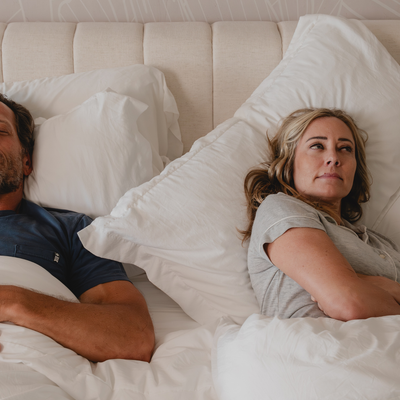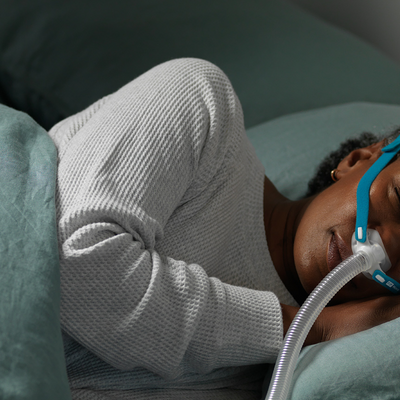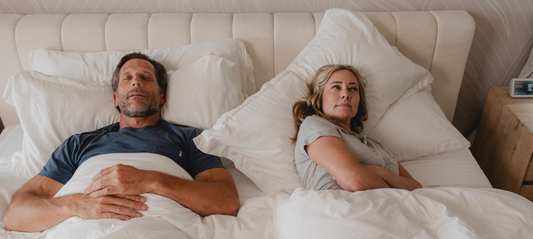How CPAP Therapy Affects Your Skin
CPAP therapy is the gold standard for treating sleep apnea and can lead to better sleep, higher energy levels, and sharper focus. But while CPAP masks are essential for treating sleep apnea, the masks can also pose challenges for your skin. Some people experience irritation, redness, breakouts, or dryness from their masks. This is usually due to friction, trapped moisture, and exposure to pressurized air.
This all can throw off your skin’s natural balance, so if that’s you, you’re not alone! In fact, this common condition is known as CPAP dermatitis, a form of skin irritation caused by prolonged mask wear. Fortunately, with the right CPAP setup, skincare routine, and cleaning habits, you can enjoy the benefits of CPAP therapy without compromising your skin health.
Common CPAP-Related Skin Issues
Many CPAP users experience skin concerns related to their therapy, from mild irritation to more severe cases of CPAP dermatitis. Below are the most common issues and their underlying causes. Learn the best way to clean CPAP equipment effectively, and discover clearer-feeling skin.
-
Mask-Related Irritation: If you’re CPAP mask is too tight or has the wrong fit, it can cause red marks, chafing, and discomfort on the bridge of the nose, cheeks, and forehead. Silicone mask cushions are designed to be as comfortable as possible but can sometimes lead to mild sensitivity. Make sure you have the proper mask fit and use mask liners to help reduce friction and pressure points.
-
Breakouts & Acne: CPAP masks can result in oil, sweat, and bacteria on the skin, which can clog pores and lead to breakouts. Regularly clean your CPAP equipment and wash your face morning and night to reduce these symptoms.
-
Dryness & Sensitivity: Continuous airflow from a CPAP machine can reduce your skin’s natural moisture and cause dryness and flaking. If you have a higher CPAP pressure setting or live in a dry climate, you may be more prone to this issue. Apply a CPAP-safe, non-comedogenic moisturizer before bed, and use a CPAP humidifier with your machine to help keep skin hydrated.
-
Pressure Sores: Wearing a CPAP mask in the same position every night can lead to pressure sores, particularly on bony areas like the bridge of the nose or cheekbones. A mask that is too tight can also contribute to skin breakdown over time. Rotate between different mask styles, use memory foam cushions, and loosen straps slightly to help relieve pressure and prevent sores.
When you know the common causes of these skin issues, you can take steps to keep your skin healthy while also maintaining effective sleep apnea treatment.
7 Tips for Keeping Your Skin Clear While Using CPAP
1. Wash Your Face Before Bed
One of the easiest ways to reduce CPAP-related skin issues is by washing your face before putting on your CPAP mask. A clean face helps prevent oil, dirt, and bacteria from becoming trapped under the mask, reducing the likelihood of acne and irritation. Use a mild, fragrance-free cleanser designed for sensitive skin. Harsh soaps can strip the skin of its natural oils, making irritation worse. If you have dry skin, opt for a hydrating cleanser that maintains moisture while removing impurities.
Shop Sleep Ritual Cleanser
★★★★★
“My new favorite product! I am so happy that I tried this product out. It doesn't dry my skin, and it leaves me all clean and ready to go to sleep. Also, it keeps my mask cleaner. A game changer!” — Rolando M.
2. Choose a CPAP-Friendly Facial Moisturizer
Keeping your skin properly hydrated can prevent dry patches and irritation caused by mask friction. However, not all moisturizers are compatible with CPAP therapy. Heavy, oil-based creams can create a greasy barrier that messes up the mask seal and leads to air leaks. Apply moisturizer at least 30 minutes before wearing your CPAP mask so it fully absorbs into the skin before you go to bed.
Shop Sleep Ritual Moisturizer
3. Ensure a Proper CPAP Mask Fit
A well-fitted CPAP mask is essential for both comfort and skin health. If your mask is too tight, it can create pressure points that lead to redness and irritation. On the other hand, a loose mask may shift during sleep, causing friction that can make your skin feel sensitive. If you frequently wake up with marks or discomfort, consider adjusting your headgear or switching to a different style, like a nasal pillow mask, which sits more lightly on the face. Lofta’s team of CPAP experts can help you find the perfect fit to prevent irritation while maintaining an effective seal.
4. Use a CPAP Mask Liner
If you experience skin irritation, itching, swelling, or redness. If you experience these symptoms, try using fabric mask liners. Mask liners add a soft layer between your skin and the mask, reducing friction and absorbing moisture to keep you more comfortable. Plus, they can help improve the fit and seal, making your therapy more effective.
Shop RemZzzs Full CPAP Mask Liner
★★★★★
“I bought the liners hoping they’d reduce the ref lines I have on my face when I wake up. They work great! I’ve noticed a significant reduction in red line marks. An added bonus to me was that the mask sealed better and I slept more soundly through the night. Highly recommend!” — Kaiser M.
5. Rotate Between Different CPAP Mask Types
If you notice irritation in the same spots night after night, alternating between different mask types may help. For example, if a full-face mask is causing pressure on your cheeks, switching to a nasal mask or pillows for a few nights can give your skin a break. Some CPAP users also benefit from using a mask liner, which creates a soft barrier between the mask and the skin, reducing friction and absorbing excess moisture.
Shop Lofta’s CPAP Masks
6. Keep Your CPAP Mask and Equipment Clean
Proper CPAP hygiene is crucial for preventing skin irritation and breakouts. A dirty mask can harbor bacteria, oils, and allergens that come into direct contact with your skin every night. Wash your CPAP mask daily with warm water and mild soap, making sure to rinse thoroughly to remove any residue. Wipe down the mask cushion with CPAP wipes between washes to prevent buildup. The tubing and humidifier chamber should be cleaned weekly to prevent the growth of mold or bacteria. Lofta offers a range of CPAP cleaning solutions, including CPAP mask wipes, sanitizing sprays, and UV sanitizers, to make it easy to keep your machinery clean.
7. Use a Heated Humidifier to Combat Dryness
If you experience excessive dryness from CPAP therapy, incorporating a heated humidifier can make a significant difference. CPAP humidifiers add moisture to the pressurized air, preventing dryness in the airways and the skin. Adjusting the humidity settings to match your comfort level can help minimize dry patches and flaking, especially in colder months. If you’re using a nasal mask, consider adding a heated CPAP hose to maintain moisture throughout the night.
Shop Lofta Humidifiers
7. Replace CPAP Mask Cushions and Filters Regularly
Over time, CPAP mask cushions lose their seal and begin to trap more dirt and oil. It’s important to replace your mask cushions every 1-2 months and your mask every 3-6 months to ensure a secure fit and hygienic use. CPAP filters should also be replaced regularly to reduce exposure to allergens and improve air quality. Keeping up with these replacements will improve both your sleep therapy and your skin health.
Shop CPAP Mask Cushions
Find the Right CPAP Routine with Lofta
CPAP therapy is essential for managing sleep apnea, but it doesn’t have to come at the cost of your skin's health. Make sure to stick to a proper skincare routine, find the right fit for your CPAP mask, and keep your equipment clean. That way, you can feel refreshed with comfortable, clear skin.
Our team here at Lofta can support you on your sleep therapy journey. Whether you need a better-fitting CPAP mask, high-quality cleaning supplies, or expert guidance, we’re dedicated to making your CPAP experience as comfortable and effective as possible. Explore Lofta’s CPAP solutions today to help support both your sleep and your skin health!










































